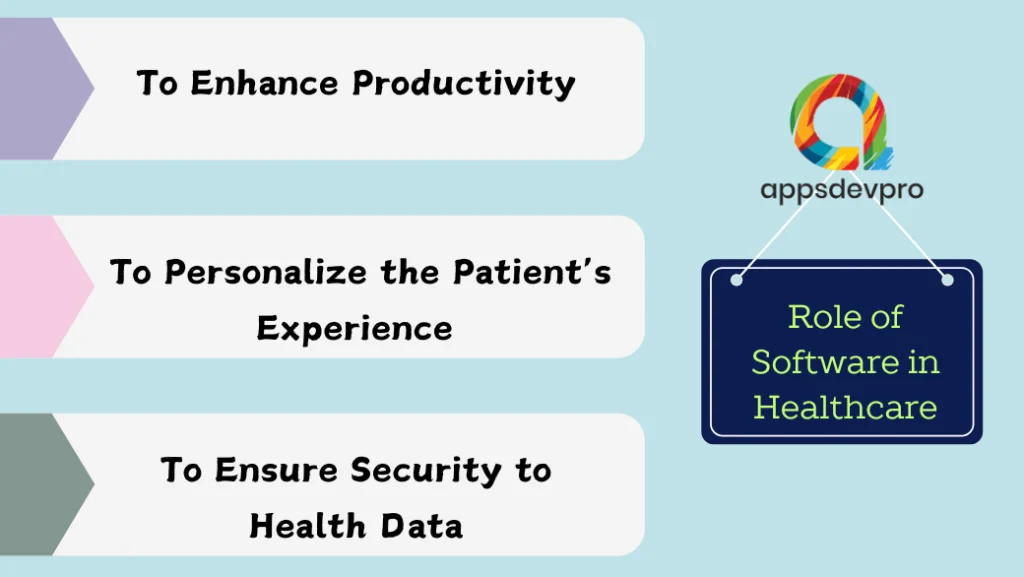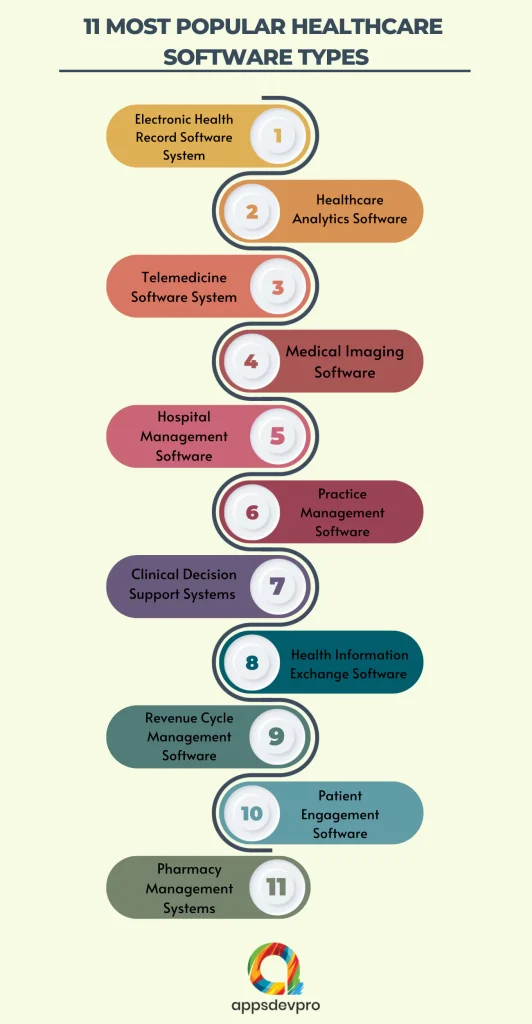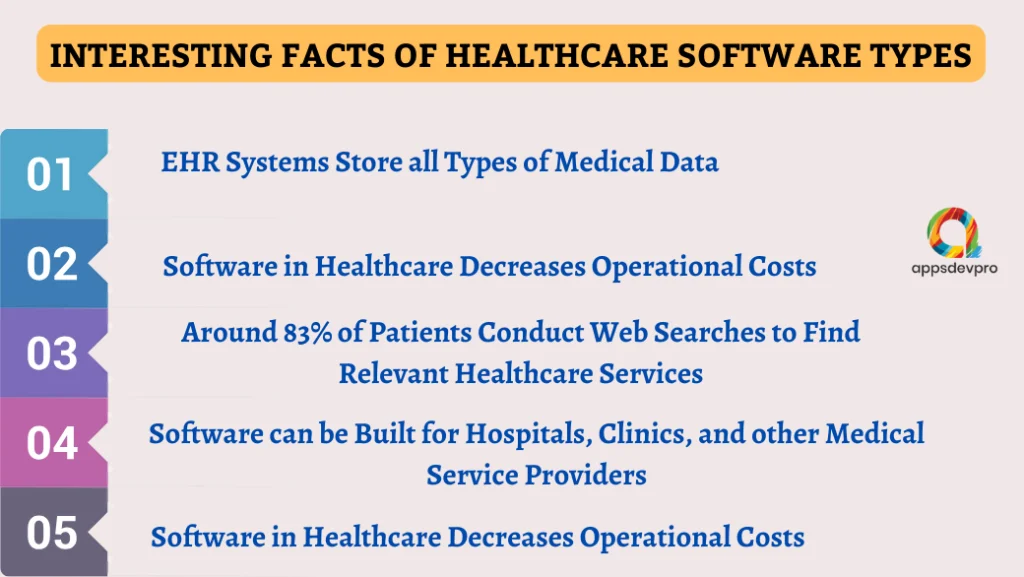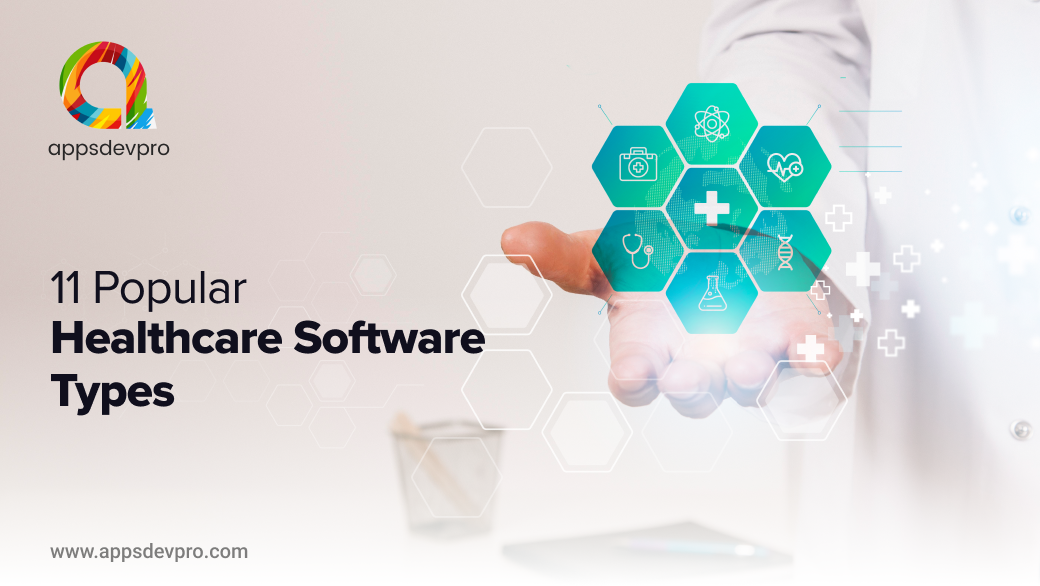Start your dream project?
We have a TEAM to get you there.The owners of a healthcare organization might be wondering about automated solutions to improve patient care. We believe that after reading this article, you will be able to get a proper understanding.
Healthcare software is basically an IT program that provides patients with the utmost comfort and convenience. Since technological advancements are taking place at a faster pace, organizations are also trying to cope with the challenges by implementing Healthcare Development Solutions. These help the service providers expand their services and enhance overall medical services.
Modern data platforms and cloud capabilities ensure smarter work operabilities in healthcare. A revenue of USD 662 Billion shall be generated by the healthcare industry by 2026. This is because the software applications (mobile or web) will improve patient care and manage health data promptly.
But first, business owners must check out the software that could be implemented according to their services. The video here describes each of the software in a simplified way.
Hope you get the relevant knowledge from the visual. There is a lot more to understand regarding various healthcare software types. Let us begin with the specifics.
What is the Role of Software in Healthcare?
Enterprises must be aware of the concept of implementing a software application and the benefit of converting manual processes into automation.
The foremost reason for writing this blog is to share why healthcare organizations must implement software in their clinical process. The answer to this question is shared in terms of pointers below:
To Enhance Productivity
Several processes need to be accomplished in a day for healthcare organizations. Thus, a software application enables quick entry of a patient for an appointment, check out recent surgeries, and provide prescriptions to the customers online. The tasks are automated, and the attendance of the nursing staff is checked. The owners can track the progress of personnel working to sophisticate the process.
To Personalize the Patient’s Experience
The patients have to deal with concerns of quality care, appointment scheduling, and affordability. Most patients cannot afford to receive treatment from the top hospitals. However, a software system allows patients to connect with the doctors and nursing staff online without any barriers. They can get the treatment cost-effectively with a belief in receiving convenient patient care.

To Ensure the Security of Health Data
Traditional healthcare work provides accessibility to random users but with a software system, only authentic users can access the system. The data entry will only be done by authorized personnel. Data security helps in avoiding malicious activity on the network.
If you are thinking that an antivirus can work then you are not 100% right. This is because hackers are already aware of the ways to decode such software applications. A convenient solution for healthcare organizations is to build custom software.
They can Hire Developers from an outsourcing company such as AppsDevPro who will build secure web applications. Authentication and access control are some of the features that will be included during product development.
Now that the role of a software system is cleared. Let us discuss the various Healthcare Software Types.
What are the 11 Most Popular Types of Software Used in Healthcare?
It is essential to understand why the healthcare industry has to implement software. Do they receive profits in terms of revenue or to enhance the customer experience? Whatever it is, let us discuss it in detail in the further sections of this blog but before that understand discrete Healthcare Software Types.
1. Electronic Health Record Software System
EHR saves data specifically of patients meaning that no other healthcare data is included except patient’s details. The medicines, dosage, treatments, diagnosis times, and more are checked. This ability of the software holds value for businesses. This is one of the most commonly used Healthcare Software Types that provide treatment plans, AI in Radiology images, medical history of the patient, medications required, and lab results.
2. Healthcare Analytics Software
Due to increased competition in the industry, organizations must improve their services to maintain stability. How this will be done? Simply by analyzing the trends and patterns of patients’ behavior which will be provided by the Healthcare Analytics Software. The nursing staff will understand the difficulties of patients and quickly solve them with ease.
3. Telemedicine Software System
Remote consultation with patients helps even the people who are staying in urban areas to join and get proper treatment. The best part is that there is no concern about creating a file as every data is saved online. Patients and doctors can check the information by logging into the portal with valid credentials.
4. Medical Imaging Software
Generally, radiologists require Imaging Software to check X-rays, CT scans, MRIs, and ultrasounds. This enhances the workflow as the data can be retrieved faster to diagnose a patient. The beneficial aspect is that the information is saved in the database that can be accessed by the nursing staff for further medical procedures.
5. Hospital Management Software
The industry specialists are discussing statistics that by 2027, healthcare software solutions will generate a revenue of $62.17. Hospital Management System utilizes AI & ML algorithms that automate repetitive tasks. Other technologies that are implemented are Big Data and Blockchain. The software basically helps in managing medical data, healthcare inventory management, appointment scheduling, providing healthcare analytics, ensuring security, and medical billing.
The owners are now wondering about the cost, right? Well, it depends on the design requirements, the development team you have, and the business size. Hire Web Developers from AppsDevPro who can build effective web and mobile applications for the convenience of your healthcare organization.
6. Practice Management Software
The crucial challenge that medical service providers are facing is manual operations. They want to convert the processes entirely to automation which is possible with Practice Management Software. Billing and invoicing, patient registration, insurance verification, and reporting are some of the features and functionalities of the software. Do you wish this software could avoid paperwork? Definitely, yes. The data will also be saved in the database system that can be edited at any time.
7. Clinical Decision Support Systems
As the name suggests, the software allows organizations to understand the patient’s requirements. Medical errors are reduced and best practices are implemented to provide flexibility for medical services.

8. Health Information Exchange Software
A patient’s medical information is shared electronically with such a platform. For example, if there is a child who is taking a treatment for a particular disease then parents can connect with the healthcare service providers. The information exchange is secured which includes imaging reports, lab results, and other medical records. This platform also ensures continuity in patient care.
9. Revenue Cycle Management Software
Stability and sustainability in the business are core competencies to stay ahead of competitors. Thus, Revenue Cycle Management Software can be implemented that reduces billing errors, complies with regulatory requirements, and improves cash flow. Moreover, administrative processes are sophisticated and flexible.
10. Patient Engagement Software
The web or mobile application is only for managing the patient data. This includes appointment scheduling, and secure messaging with doctors, improving patient-provider relationships, and enhancing adherence to treatment plans.
11. Pharmacy Management Systems
Patients who are disabled, children, or pregnant women find it difficult to get prescriptions from offline stores. The Pharmacy management systems automate and streamline pharmacy operations that is recording the illness of a patient and then providing relevant medication. The doctors will not have to wait for a patient to provide a documented prescription.
Healthcare organizations have to select among healthcare software types that would be beneficial to enhance patient care.
Also Read: IoT In Healthcare Apps
How Has Healthcare Software Helped Patients and Doctors?
The purpose of implementing healthcare software is to get rid of data redundancy and implement full automation. There are numerous benefits of Digital Transformation in Healthcare for the service providers and the patients. Some of the critical aspects are shared below for your convenience:
Healthcare Digital Transformation for Patients
There are several ways in which the patients receive utmost care.
- Accessibility of data by the patients helps them to get medical consultations on a timely basis. The digital records allow patients to share a query regarding treatment or medications.
- Patients receive a guarantee that they will be receiving precise diagnoses with minimized errors in the health reports.
- Quick chat options in mobile and web applications allow patients to connect with the nursing staff in less time.
These benefits are available when the hospitals have upgraded their processes to automation. The discussed healthcare software types are hence effective for healthcare organizations.
Healthcare Digital Transformation Benefits for Healthcare Service Providers
Multiple benefits are available with Healthcare Software. Check these below:
- Manual work is reduced to an extent to which healthcare professionals can focus entirely on patient care. Less paperwork provides ample time for the nursing staff to complete the follow-up procedures.
- Healthcare software types help an organization to ensure ethical standards and adhere to regulations.
- Stakeholders of a healthcare organization experience reduced operational costs. Because the processes are automated they require less workforce and lower inefficiencies improve quality.
Doctors who have relevant experience might be wondering about starting their services online. They can Hire Kotlin Developers to include various features in the mobile or web application. Outsourcing can be conveniently done from AppsDevPro, an IT firm that specializes in providing skilled personnel according to your business needs.
5 Interesting Facts About Healthcare Software Types
$5 billion is the expected rate at which the healthcare market can grow in 2027. This report was created after the worldwide coronavirus outbreak. The purpose of sharing these statistics is that the fintech companies who are willing to implement technology can do it without any second thought.
Fact 1# EHR Systems can store patient medical histories, treatment plans, lab results, and other clinical data electronically.
Fact 2# The role of Software in Healthcare is to enhance efficiency, manage operational costs, and provide better care to patients.

Fact 3# Around 83% of the patients conduct web searches for a particular healthcare organization. These statistics are important for your organization because you need to stand out among the competitors.
Fact 4# Hospitals, clinics, and those who provide medical facilities can build an application according to various healthcare software types.
Fact 5# Technologies such as virtual reality, the Internet of things, artificial intelligence, and machine learning enhance the working of healthcare software.
The business might stop at the average cost of building healthcare software. We would like to inform them that there are numerous factors according to which the cost depends. This includes a type of medical services, patient size, and total business goal.
Want to Build Robust Mobile Applications? Hire Java developers from AppsDevPro!
7 Reasons to Build Healthcare Software in 2024
This blog is about to end and we hope that you have got the idea for the kind of application you want among the discussed healthcare software types. If the answer is yes or you are still in doubt then must read this section.
1. The Medical Processes are Full of Errors
Manual data entry and handling increase the likelihood of errors, such as typos in patient records or incorrect billing information. These are usually human errors that pile up continuous issues throughout the entire medical procedure.
2. Compliance and Regulatory Risks
Healthcare organizations have to follow compliance standards strictly which is hampered with manual processes. Thus, to maintain consistency, a software application is required.
3. Boosts Patient Experience
There will be hardly any patient who can wait to get an appointment or to get a medical report. The benefit of integrating healthcare software types in your organization is to receive patient satisfaction.
4. Analytics and Insights for Owners
A hospital or a clinic whichever you owe is an investment from which profits are expected. To get the real bucks, proper insights have to be analyzed. Anyone you choose between various healthcare software types will be helpful to increase operational efficiency and financial performance.
5. Manageable Operational Costs
Are you facing trouble with managing labor and operational costs? No worries, implement any of the healthcare software types to reduce the cost of staffing, training, and correcting errors in the health data.
6. Security Assurance
Security cannot be expected from manual healthcare operations. But with software, it is possible. There will be limited authorized users to access the data rest will be restricted. Healthcare organizations can safeguard medical information to protect patient’s privacy.
These are the common reasons that we have stacked for the healthcare organization. If you have any queries then contact our experts today! They will guide you through various healthcare software types and accordingly suggest one for your business.
Conclusion
Many healthcare software types are available for medical service providers. But they have to gain proper knowledge to implement the right one for improving their service. This can be concluded from this detailed blog that proper management of healthcare data leads to impactful patient care.
If there are no concerns from the patients then it is sure that the business operations are running smoothly. However, not only building software is enough but its maintenance is equally important. Organizations must continue to update their applications to maintain reliability.
Why Select AppsDevPro to Build Healthcare Software?
Outsourcing developers to build effective software applications can be challenging but with AppsDevPro, the process is convenient. Our experts have the skillset and knowledge to meet the requirements according to the healthcare software types that you want to develop.
AppsDevPro is an IT solutions company that provides practical solutions for companies who want to Hire Developers. Our experts thoroughly understand the business requirements and provide supreme solutions. The clients can perform real-time project tracking.
FAQs
There is a specific reason to share the queries here with you so that you can analyze the importance of healthcare software types for your medical services.
What is the Most Used Healthcare Software?
Electronic Health Record is the most widely used healthcare software in 2024. Because the software allows the organization to manage data properly even on a large scale.
Which Operating System is Used in Healthcare?
Operating systems allow users to connect with the services in regards to a platform. The software for healthcare generally runs on Linux but the development can assure it later after the deployment.
How Many Modules Are Used in Hospital Management Software?
HMS is a widely used software application that includes various modules that are:
- Operational and Tactical System
- Administrative System
- Subject-Based System
- Task-Based System
- Billing System
The clients can customize the software according to their specific needs.
How Technology Has Improved Healthcare in 2024?
Advanced healthcare monitoring systems and patient management have helped the organization to gain a competitive edge in the market. Everything depends on how convinced a patient is with the medical services. This actually decides whether that particular organization will gain stability in the market or not.
What Will be in Medical Technology in 2025?
Remote Patient monitoring that is AI-powered is predicted to be implemented by healthcare organizations. This will be one of the supreme healthcare software types that will enable patients to gain proper care from the healthcare service provider.

